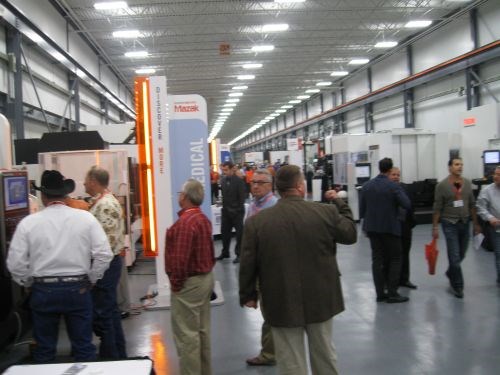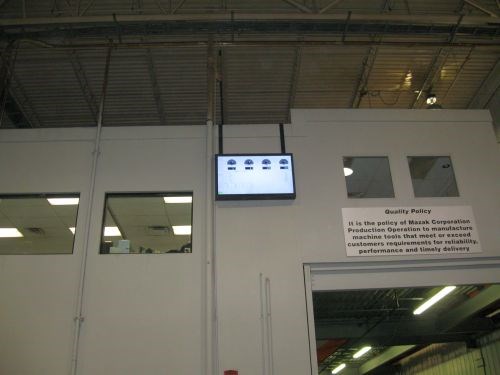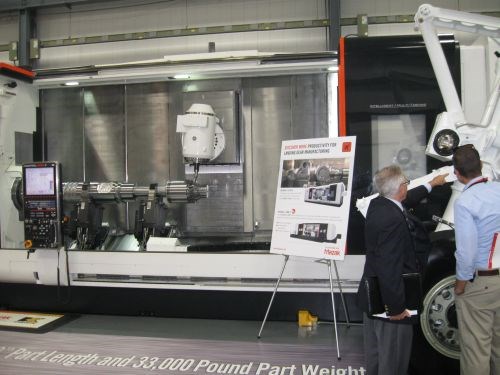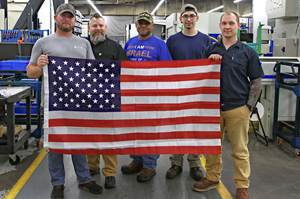Mazak Invests in Production Capacity, Future Workforce
Next year, Mazak will celebrate 40 years of manufacturing in Kentucky. In time for that anniversary, the company will complete the latest expansion of its Kentucky manufacturing facilities—an expansion that is currently underway, and that aims at increasing the production capacity at this site from 140 machines per month to as many as 200.
Share


Autodesk, Inc.
Featured Content
View More
Hwacheon Machinery America, Inc.
Featured Content
View More

.png;maxWidth=45)
DMG MORI - Cincinnati
Featured Content
View More


ECi Software Solutions, Inc.
Featured Content
View More


Mazak’s Discover 2013 event includes machine demonstrations and technical seminars in the company’s technology center (where this photo was taken), as well tours of the company’s Kentucky production operations.
Next year, Mazak will celebrate 40 years of manufacturing in Kentucky. In time for that anniversary, the company will complete the latest expansion of its Kentucky manufacturing facilities—an expansion that is currently underway, and that aims at increasing the production capacity at this site from 140 machines per month to as many as 200.
Those capacity figures are approximate, because they are affected by the mix of machine orders. More than 100 of the company’s machine models are produced at this plant. If the order mix shifts toward smaller machines, then more units per month can be produced. But that is not what’s happening right now, the company says. In part because of the aircraft industry, and in even larger part because of the oil and gas industry, Mazak has been seeing strong demand for many of its largest-size machines.
The company’s “Discover 2013” event, being held this week and next, offers visitors to the Kentucky facility the chance to see live machine demonstrations and participate in seminars on various topics in machining and manufacturing. Visitors to the event also have a chance to tour the company’s manufacturing operations.
In expanding those operations, the company faces a familiar challenge—familiar to both the machine tool maker and its customers. Namely, there is a relative scarcity of skilled manufacturing employees in the local labor pool.
In a speech yesterday at the company’s event, Mazak USA president Brian Papke said that manufacturers themselves ought to take a leading role in addressing this challenge. Together, they should provide for enough training opportunities that the pool of prospective manufacturing employees will grow.
The event this week was preceded by an outreach event in which the company opened its doors to more than 200 students from area high schools, as well as from Gateway Community & Technical College. Mazak partners with this institution, providing manufacturing students at the school with work-study opportunities aimed at skilled job positions with the company.
Mr. Papke, along with Ben Schawe, Mazak’s VP of manufacturing, described the effort and commitment necessary to provide for ongoing development of new manufacturing talent. Training has to be an expected part of the culture, they said. At Mazak, Gateway students are given assignments in various parts of the plant to help them find the work that suits them, and the students are assigned mentors who guide them in this exploration. The mentors take this role seriously, and the organization accepts that allowing some time to be spent in a seemingly unproductive way on young trainees is an important investment that will contribute in the long term not only to the company’s success, but also to the success of the manufacturing community overall.

To those who have toured the Kentucky plant before, a notable recent change is the increased use of robots for machine tending. On these machines making spindle components, a process formerly employing gantry loaders was replaced with a robot-fed process delivering greater throughput. The company routinely implements process improvements such as this not only for the sake of its own efficiencies, but also to develop an improved understanding of technologies offered to customers.

The plant is integrating machine tools into a plant-wide machine monitoring system taking advantage of MTConnect. Dashboards in the production area communicate machine utilization.

The company is seeing strong demand for large-scale offerings like this Integrex multitasking machine. Mazak displayed the machine alongside an aircraft landing gear.
Related Content
The Power of Practical Demonstrations and Projects
Practical work has served Bridgerland Technical College both in preparing its current students for manufacturing jobs and in appealing to new generations of potential machinists.
Read MoreFinding Skilled Labor Through Partnerships and Benefits
To combat the skilled labor shortage, this Top Shops honoree turned to partnerships and unique benefits to attract talented workers.
Read MoreHow to Pass the Job Interview as an Employer
Job interviews are a two-way street. Follow these tips to make a good impression on your potential future workforce.
Read MoreAddressing the Manufacturing Labor Shortage Needs to Start Here
Student-run businesses focused on technical training for the trades are taking root across the U.S. Can we — should we — leverage their regional successes into a nationwide platform?
Read MoreRead Next
Registration Now Open for the Precision Machining Technology Show (PMTS) 2025
The precision machining industry’s premier event returns to Cleveland, OH, April 1-3.
Read MoreBuilding Out a Foundation for Student Machinists
Autodesk and Haas have teamed up to produce an introductory course for students that covers the basics of CAD, CAM and CNC while providing them with a portfolio part.
Read More5 Rules of Thumb for Buying CNC Machine Tools
Use these tips to carefully plan your machine tool purchases and to avoid regretting your decision later.
Read More












.png;maxWidth=150)

































